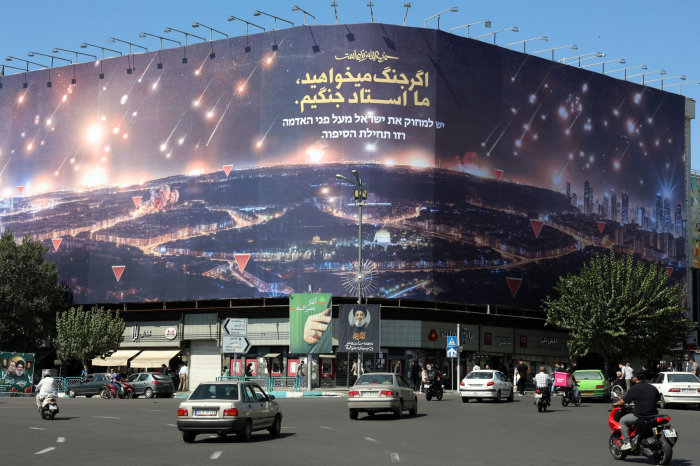Tehran said it is "entitled and obliged to defend itself" after Israel launched retaliatory airstrikes against Iran early Saturday.
Describing Israel's attack as a "clear violation" of international law, the Iranian foreign ministry said Tehran "considers itself entitled and obliged to defend itself against foreign acts of aggression."
Iran reported “limited damage” from Israel's airstrikes early Saturday amid fears of retaliation and an escalation in the Middle East conflict.
Iranian officials told government broadcaster IRNA that the Israeli strikes targeted military bases in the Ilam, Khuzestan and Tehran provinces. Iran's air defense system successfully tracked and countered the Israeli “aggression,” they added.
Two Iranian soldiers were killed in the attack, IRNA reported.
The strikes came as a response to to an Oct. 1 Iranian attack on Israel that struck military bases and civilian infrastructure. Israel said it was on "peak alert" for any retaliatory response from Iran.
The U.S. urged “Iran to cease its attacks on Israel so that this cycle of fighting can end without further escalation,” National Security Council spokesperson Sean Savett said.
“The United States was not a participant in this operation. It is our aim to accelerate diplomacy and de-escalate tensions in the Middle East region. We urge Iran to cease its attacks on Israel so that this cycle of fighting can end without further escalation,” he added in a statement.
British Prime Minister Keir Starmer said Israel “has the right to defend itself against Iranian aggression,” at the same time urging Tehran not to retaliate.
“We need to avoid further regional escalation and urge all sides to show restraint. Iran should not respond,” Starmer said at the Commonwealth summit in Samoa.
Saudi Arabia condemned the attacks against Iran, the Saudi Press Agency said on Saturday, against the backdrop of improved relations between Riyadh and Tehran. "The Kingdom of Saudi Arabia expresses its condemnation and denunciation of the military targeting of the Islamic Republic of Iran," Riyadh said.
It called on the parties to "exercise the utmost restraint and reduce escalation."
The United Arab Emirates "strongly condemned" the strikes against Iran, and expressed "deep concern" over the threat of escalation in the Mideast conflict, according to a statement of the country's foreign ministry.
Israeli military officials said more than 20 Iranian military facilities were struck in three waves of airstrikes early Saturday. The first explosions were reported around 2:15 a.m. local Iranian time and were heard mainly coming from the west of Tehran, according to IRNA.
Following the airstrikes, which ended just before dawn on Saturday, an Israel Defense Forces (IDF) statement said Israeli "aircraft struck missile manufacturing facilities used to produce the missiles that Iran fired at the State of Israel."
Also targeted were “surface-to-air missile arrays and additional Iranian aerial capabilities, that were intended to restrict Israel's aerial freedom of operation in Iran,” the IDF said.
The targets the Israelis chose to strike — military facilities — were in line with what the Biden administration has been urging Israel to focus on, fearing that Israeli leader Benjamin Netanyahu might instead go for Iran’s oil or nuclear facilities.
Biden earlier this month went public on how he thought Israel should shape its retaliatory strike, telling reporters he didn't think Israel should hit Iran's nuclear sites or oil infrastructure. Targeting Iran’s energy facilities would have set global oil prices rocketing, pushing up the price of gas at the pumps just before Americans are set to vote in the U.S. presidential election.
U.S. President Joe Biden said on Saturday that Israel appears to have hit only military installations in Iran. “It seems that Israel did not hit anything that was not a military target,” Biden told reporters.
"I hope this is the end," he added.
U.S. officials have made clear in recent weeks their fear that if Israel did decide to mount a much bigger attack than it did on Saturday, then the Iranians would be forced to launch an equally large-scale attack in retaliation, making an all-out war more likely.
Politico
More about:
















































